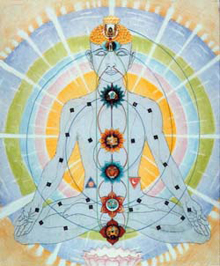What is Reiki?
Reiki (ray-key) is Japanese for “universal life energy” and is a non-invasive therapy that involves stimulating the body’s own healing potential, much like acupuncture, but without the use of needles. The aim of a Reiki treatment is to balance the energy centres in the body (chakras) and promote healing.Chakra is a Sanskrit word whose literal translation is wheel. The Chakras are the energy centres within the body. There are seven main chakras as well as many other minor chakras throughout the body. The chakras draw in energy from our energy field, or aura, and distribute that energy to the vital organs within the physical body.
A Reiki Practitioner transfers energy by gently placing their hands, non-intrusively, in a series of positions from the top of the head to the feet, in order to restore balance in your body. Reiki is especially known for its healing effects on an emotional and spiritual level, though it is not linked to any religious beliefs. During a Reiki treatment, you may feel warmth, tingling or perhaps nothing at all during sessions, but Reiki can have a deeply relaxing effect on the body. Please note, you will not be expected to remove any clothing for treatment. If you are feeling stressed or overwhelmed, book a Reiki treatment today, to help you get back on track.The History of Reiki

Reiki FAQs
Will I have to remove any clothing for a Reiki treatment?
No. The Reiki energy passes easily through clothing.
What should I wear for a treatment?
Ideally you should wear loose, comfortable clothing that you can easily relax in.
Can Reiki do me any harm?
No. Reiki is totally harmless. Your energy system will accept only as much energy as is beneficial for it.
I have heard that there are many different kinds of Reiki. Which one is the best?
The original Reiki system is called the Usui system because it was rediscovered and developed by Dr Usui. All other forms of Reiki have been developed in the West based on personal insights by various Reiki Masters. It is not important what the system is called. What matters is the integrity of the Reiki practitioner and the quality of energy they are able to make available to you.
How do I choose a Reiki practitioner?
It is best to follow your instincts and intuition when choosing a Reiki practitioner. Have a chat with the practitioner before you commit to having a treatment and make sure you feel comfortable with the practitioner. Healing is greatly enhanced if you can relax during treatment and if you trust the practitioner.
How many treatments will I need?
The number of treatments depends on the individual and varies from person to person. Some people get all the benefit they need from a single treatment wheras others will require a series of treatments.
I don’t have any illness – can Reiki still benefit me?
One of the best uses of Reiki is as a preventative treatment. Regular monthly treatments can help to maintain good health and help you to stay relaxed.
Is Reiki similar to Spiritual Healing?
Reiki and Spiritual Healing are similar insofar as they both entail a practitioner making energy available to the client and are both considered to be hands-on treatments. However, Reiki is not connected with any religion and is open to people of all faiths.
Is a Reiki treatment completely ‘hands-on’?
Sometimes it will help the healing process if the practitioner can lay his or her hands on the physical body but this not always necessary and much benefit can be gained from treating the person’s energy field, or aura. If you feel unsure about being touched it is best to tell the practitioner in advance so they know what sort of treatment you will be most comfortable with.
If you have a question that is not answered on this page please send us an e-mail 
